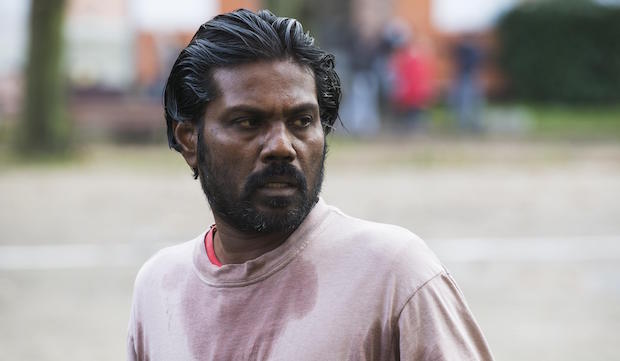Dheepan director Jacques Audiard: 'It's a fiction...France actually welcomed migrants and refugees'
The inimitable Jacques Audiard talks winning Cannes' highest award – and why there's nothing political about Dheepan

The Cannes Palme d’Or is one of the most coveted prizes in cinema. Taxi Driver, Apocalypse Now, Secrets & Lies: if you’re looking for a grounding in film history, you could do a lot worse than make your way through the list previous winners. In 2015, Dheepan became the latest edition to this hall of fame, scooping up that most glittering of accolades.
Directed by Jacques Audiard, he of Rust and Bone fame, it tells the story of a former Tamil Tiger who escapes to France, fake family in tow, only to find more violence awaiting him in the Parisian suburbs. It's a thrillingly constructed and radical piece of cinema that deals in humane and personal terms with the immigrant experience, echoing with a lyricism characteristic to Audiard's work.
Culture Whisper spoke to the director and lead actors during the London Film festival.

Jacques Audiard, Dheepan director
Dheepan: Interview with Jacques Audiard, Antonythasan Jesuthasan and Kalieaswari Srinivasan
The otherwise spotless suite of London hotel where we await Audiard has the faint smell of stale cigarettes. People bustle around urgently, awaiting Audiard's arrival – he's in predictably high demand. The whole event feels suitably manic for a post-Cannes junket – but it also means every minute must count.
Eventually Audiard himself sweeps into the room, wearing his signature trilby, followed by his two leading actors. After them trail a French translator, and a Tamil one. "Can I have a cigarette before we start?" asks Audiard, not really asking, and three of them squeeze out on to the tiny ornamental balcony, giggling behind the curtain – the musky smell now accounted for.
Cigarettes smoked, it's time to get down to business – but this too proves difficult, for every question has to circulate through both translators so that everyone can understand what's being said. It also hints at the struggles the crew must have faced on set: eighty-five percent of Dheepan's dialogues are in Tamil, but the film was shot in France. "Jacques doesn’t know a word in Tamil and I know nothing about French, though I tried to learn." says Kalieaswari, who plays Yalini, Dheepan's wife. "But after a point the communication, I feel, went beyond the language."
She's right: many of the most poignant emotional moments are conveyed through looks and gestures alone. "That’s the beauty of the art of cinema. That’s why the movie is able to reach out to people who are not able to understand a word of Tamil or French or English."
Audiard's idea for Dheepan came after shooting his brilliant work of 2009, Une Prophete: a film that deals with similar subjects of social exclusion and the immigrant experience. For Dheepan, says Audiard, he wanted "to do a remake of Sam Peckinpah's Straw Dogs, and have an immigrant coming from far away into the banlieues [the Parisian suburbs]."
"I wanted a character that had no relationship with the French language," says Audiard. "Who wasn’t going to be somebody from an ex-French colony. By deduction, I decided on Sri Lanka, and then I discovered what was going on there. It wasn’t something that had been reported on almost at all in France."
Apparently Audiard couldn't even locate Sri Lanka on a map before he started his research. "I saw films like The Killing Fields and No Fire Zone – and then I started meeting the Tamil people." It was then that he met Antonythasan Jesuthasan (he goes by the anglicised 'Anthony') – a real ex-Tamil tiger who had fought in the war.

As the film goeson, the struggles of its make-believe family shift. What starts as a film about refuge, violence and war becomes a mediation on love and homesickness; gender relations and post-combat trauma.
Dheepan's real triumph is in how – as with last year's documentary A Syrian Love Story – it grounds its story on personal issues, rather than painting some homogenous picture of 'the immigrant experience'. Audiard uses Dheepan as a springboard to consider wider social issues of poverty and violence – not in Sri Lanka, but at home in his own Parisian suburbs. The film then shifts again, culminating in gripping action sequences that wouldn't be out of place in a gangster film.
A question about the underlying 'message' of Dheepan is sardonically met ("messages are for mailboxes") but of his project, Audiard is clear. "I wanted to take somebody with no name, no face, no body, no thought – and to give him a name, a face, a body, a thought. And film it in cinemascope."
It's still tempting to read the film as a political statement, its subject is so pertinent and timely. But Audiard remains adamant that wasn't his intention: "if you have a look at what France did at the time, they actually welcomed migrants and refugees." Whilst his film might imply otherwise, the subject, he says, is not grounded in reality. "It’s a fiction," he stresses.

"I don't think I was making a statement about how badly France takes in immigrants, or making a comparison between France and England. And –" he says "– if you ask Anthony how it has been for him, he has been very well received in France." It's hard to deny that the film's subject is a timely one: "maybe it’s a sort of bad luck" he suggests, "this strange confluence between reality and this fiction."
That his film might impact attitudes towards the migrant crisis, Audiard is dubious. "I’d like it if cinema had that power. But I don’t think so, really."
Dheepan: UK Release date 8 April
Catch the Jacques Audiard retrospective at Ciné Lumière: click here to find out more.






